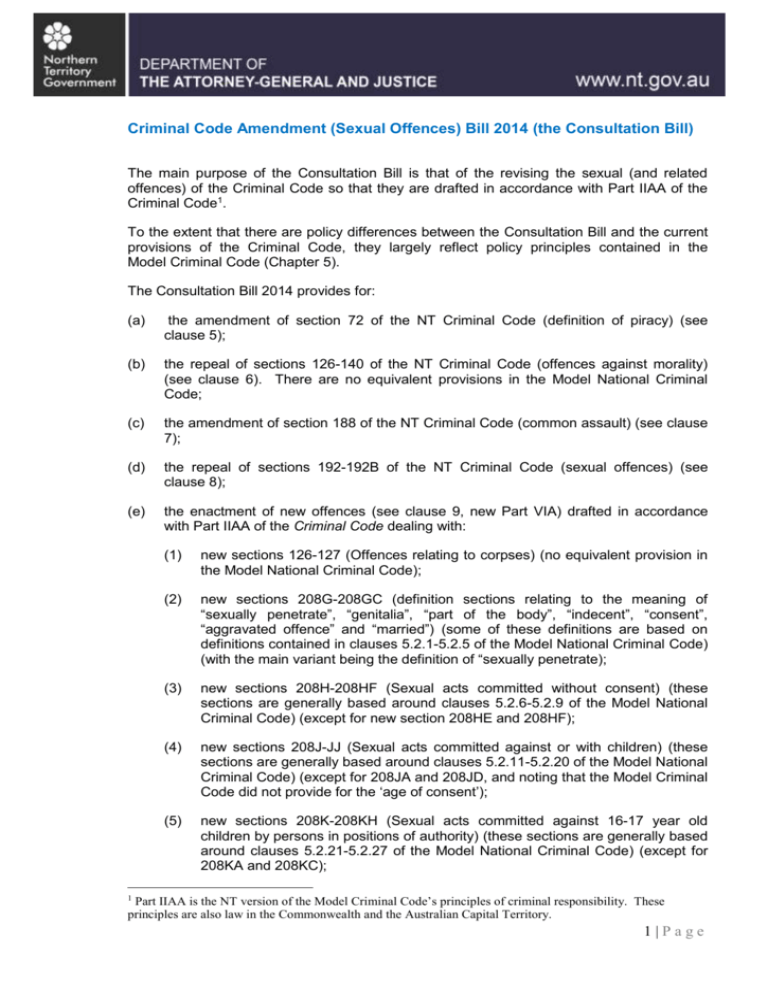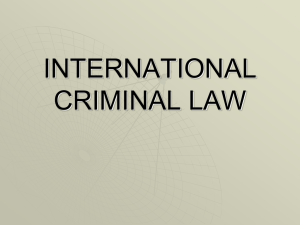
Criminal Code Amendment (Sexual Offences) Bill 2014 (the Consultation Bill)
The main purpose of the Consultation Bill is that of the revising the sexual (and related
offences) of the Criminal Code so that they are drafted in accordance with Part IIAA of the
Criminal Code1.
To the extent that there are policy differences between the Consultation Bill and the current
provisions of the Criminal Code, they largely reflect policy principles contained in the
Model Criminal Code (Chapter 5).
The Consultation Bill 2014 provides for:
(a)
the amendment of section 72 of the NT Criminal Code (definition of piracy) (see
clause 5);
(b)
the repeal of sections 126-140 of the NT Criminal Code (offences against morality)
(see clause 6). There are no equivalent provisions in the Model National Criminal
Code;
(c)
the amendment of section 188 of the NT Criminal Code (common assault) (see clause
7);
(d)
the repeal of sections 192-192B of the NT Criminal Code (sexual offences) (see
clause 8);
(e)
the enactment of new offences (see clause 9, new Part VIA) drafted in accordance
with Part IIAA of the Criminal Code dealing with:
(1)
new sections 126-127 (Offences relating to corpses) (no equivalent provision in
the Model National Criminal Code);
(2)
new sections 208G-208GC (definition sections relating to the meaning of
“sexually penetrate”, “genitalia”, “part of the body”, “indecent”, “consent”,
“aggravated offence” and “married”) (some of these definitions are based on
definitions contained in clauses 5.2.1-5.2.5 of the Model National Criminal Code)
(with the main variant being the definition of “sexually penetrate);
(3)
new sections 208H-208HF (Sexual acts committed without consent) (these
sections are generally based around clauses 5.2.6-5.2.9 of the Model National
Criminal Code) (except for new section 208HE and 208HF);
(4)
new sections 208J-JJ (Sexual acts committed against or with children) (these
sections are generally based around clauses 5.2.11-5.2.20 of the Model National
Criminal Code) (except for 208JA and 208JD, and noting that the Model Criminal
Code did not provide for the ‘age of consent’);
(5)
new sections 208K-208KH (Sexual acts committed against 16-17 year old
children by persons in positions of authority) (these sections are generally based
around clauses 5.2.21-5.2.27 of the Model National Criminal Code) (except for
208KA and 208KC);
Part IIAA is the NT version of the Model Criminal Code’s principles of criminal responsibility. These
principles are also law in the Commonwealth and the Australian Capital Territory.
1
1|Page
(6)
new sections 208L-208LG (Sexual acts committed against or with mentally
impaired persons by carers) (these sections are generally based around clauses
5.2.28-5.2.33 of the Model National Criminal Code);
(7)
new sections 208M-208MB (Incest) (these sections are generally based around
clauses 5.2.34-5.2.25 of the Model National Criminal Code);
(8)
new section 208N (Bestiality) (no equivalent in the Model National Criminal
Code);
(9)
new section 208P (Gross indecency in public) (no equivalent in the Model
National Criminal Code);
(10) new section 208Q (increased penalties for aggravated offences) (this section is
generally based around clause 5.2.36 of the Model National Criminal Code);
(11) new section 208R (legal proceedings) (this section is generally based around
clause 5.2.43 of the Model National Criminal Code);
(12) new sections 208S-208SA (general provisions) ) (these sections are generally
based around clauses 5.2.44-5.2.46 of the Model National Criminal Code);
(h)
repeal of section 319 of the NT Criminal Code (charges relating to morality and sexual
offences) (see clause 10);
(i)
repeal of section 377 of the NT Criminal Code (evidence in incest matters) (see clause
10);
(j)
the amendment of schedule 1 of the NT Criminal Code (listing of provisions to which
Part IIAA applies) of the Criminal Code (see clause 12);
(k)
transitional provisions (new sections 454-456) (see clause 11); and
(l)
a schedule of consequential amendments to the Criminal Code (see clause 13).
It should be noted that:
(a)
the maximum penalties for the offences generally reflect those in the NT Criminal
Code rather than those in the Model National Criminal Code; and
(b)
the offences are drafted in accordance with current NT drafting style.
5 December 2014
2|Page







